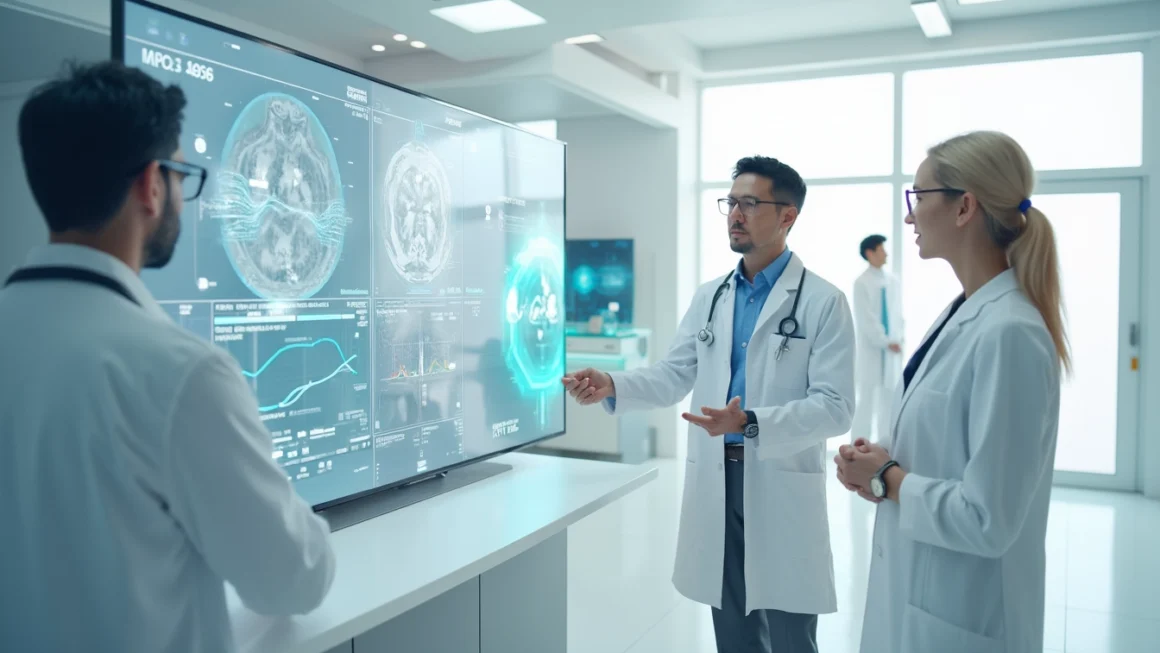The Rise of AI in Healthcare: Revolutionizing Patient Care
Table of Contents
Artificial Intelligence (AI) is rapidly transforming the healthcare industry, offering groundbreaking solutions to improve patient care and streamline medical processes. From diagnostics to treatment planning, AI is proving to be an invaluable tool for healthcare professionals worldwide.
AI-Powered Diagnostics: Enhancing Accuracy and Speed
One of the most significant impacts of AI in healthcare is its ability to enhance diagnostic accuracy. Advanced machine learning algorithms can analyze medical images, such as X-rays, MRIs, and CT scans, with remarkable precision. These AI systems can detect subtle abnormalities that might be overlooked by human eyes, leading to earlier and more accurate diagnoses of various conditions, including cancer and heart disease.
Moreover, AI-powered diagnostic tools can process vast amounts of data in seconds, significantly reducing the time required for analysis. This speed is crucial in emergency situations where every moment counts.
Personalized Treatment Plans: Tailoring Care to Individual Needs
AI is also revolutionizing treatment planning by analyzing patient data to create personalized care strategies. By considering factors such as genetic makeup, lifestyle, and medical history, AI algorithms can suggest tailored treatment options that are more likely to be effective for each individual patient.
This personalized approach not only improves treatment outcomes but also helps reduce adverse effects by avoiding treatments that may not be suitable for certain patients.
Improving Patient Monitoring and Care Management
AI-enabled devices and wearables are transforming patient monitoring, especially for those with chronic conditions. These smart devices can continuously track vital signs and alert healthcare providers to any concerning changes, allowing for prompt intervention when necessary.
Additionally, AI chatbots and virtual assistants are being employed to provide 24/7 support to patients, answering queries and offering guidance on medication management and lifestyle choices. This constant availability of information and support enhances patient engagement and improves overall care management.
Streamlining Administrative Tasks
Beyond direct patient care, AI is also making significant strides in streamlining administrative processes in healthcare facilities. From scheduling appointments to managing electronic health records, AI systems are reducing the burden on healthcare staff, allowing them to focus more on patient care.
These AI-driven administrative solutions can also help in reducing errors and improving the overall efficiency of healthcare operations. Automation tools are increasingly being used to handle repetitive tasks, further enhancing productivity in healthcare settings.
Challenges and Ethical Considerations
While the potential of AI in healthcare is immense, it’s important to address the challenges and ethical considerations that come with its implementation. Privacy concerns, data security, and the need for transparency in AI decision-making processes are critical issues that need to be carefully managed.
Moreover, there’s a need to ensure that AI systems are free from bias and that they don’t exacerbate existing healthcare disparities. Ongoing research and development are focused on creating more robust and fair AI algorithms.
The Future of AI in Healthcare
As AI technology continues to evolve, its role in healthcare is expected to expand even further. Future developments may include more advanced predictive analytics for disease prevention, AI-assisted surgical procedures, and even AI-driven drug discovery.
The integration of AI with other emerging technologies like the Internet of Things (IoT) and 5G networks is set to create even more powerful tools for healthcare professionals, potentially leading to breakthroughs in areas such as remote patient care and precision medicine.
Conclusion: A New Era of Healthcare
The integration of AI in healthcare marks the beginning of a new era in medicine. While it’s not a replacement for human expertise, AI is a powerful tool that can augment and enhance the capabilities of healthcare professionals. As we continue to navigate the challenges and harness the potential of AI, we can look forward to a future where healthcare is more accurate, efficient, and personalized than ever before.
The journey of AI in healthcare is just beginning, and its full potential is yet to be realized. As research progresses and technology advances, we can expect AI to play an increasingly crucial role in shaping the future of healthcare, ultimately leading to better patient outcomes and a more efficient healthcare system overall.




